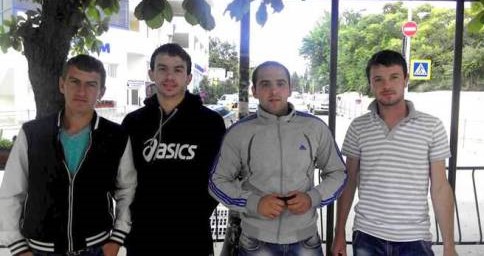• Topics / Deported peoples
• Topics / Human Rights Abuses in Russian-occupied Crimea
Prosecuted under Russian occupation for honouring Victims of Crimean Tatar Deportation

Four young Crimean Tatars from Sudak have each been fined 20 thousand roubles in Russian-occupied Crimea over a peaceful act of remembrance for the victims of the 1944 Deportation of the Crimean Tatar People which is recognized by Ukraine as an act of genocide.
A second ‘judge under Russian occupation proved more compliant than the first who back in June had shown the courage to recognize that the young men had not committed any offence.
Ablyakimov Ablyakim; Enver Chavush; Alim Muslyadinov; and Seitumerov Seitmamut were detained on May 18 (the anniversary of the Deportation) quite literally for driving through Sudak with Crimean Tatar flags on their cars. Before Russia’s invasion and annexation of Crimea, a car rally from Simferopol to Bakhchysarai was one of the traditional symbolic acts of remembrance for over 100 thousand Crimean Tatars who lost their lives during the Deportation and in the first years of exile.
The men were charged with ‘infringing the established procedure for organizing or holding meetings, demonstration, etc. under Article 20.2 of Russia’s Code of Administrative Offences.
The Sudak City Court at its hearing on June 7 found nothing illegal in the young men’s actions, however this first note of sanity in over 2 years of Russian occupation proved short-lived. The court’s decision was challenged, and on September 1 it was overturned, and ‘the case’ sent back for new consideration.
The ‘judge’ this time knew what was required and imposed the fines envisaged for the supposed ‘offence’. Judging by one of the people supporting the men, the claim from the traffic police was that the Crimean Tatar flag was “a means of campaigning”.
This is now the third year that Russia as occupying force has both banned traditional remembrance gatherings on the anniversary of the Deportation and penalized Crimean Tatars for totally peaceful action.
The 70th anniversary of the Deportation came just two months after Russia annexed Crimea. On the eve of the anniversary, all public events were banned. Although the occupation regime was eventually forced to accept that people would gather together in prayer and remembrance, all kinds of restrictions were imposed. There were even military helicopters flying over prayer gatherings outside Simferopol and Bakhchysarai, to drown out the prayers and as a form of intimidation.
There have also been detentions each year, with fines imposed for supposed infringements.
This year they used threats, detentions and even warned schools that the number of students absent would be noted and their parents asked to explain the children’s absence.
None of this, nor the FSB at gatherings openly videoing those present, stopped all the remembrance events, though most people heeded the Mejlis’ call and joined in actions around the Ukraine-wide Minute of Silence that would not provoke the so-called authorities.
Among those present at the unobstructed remembrance gathering in Kyiv was Yaakov Dov Bleich, Chief Rabbi of Ukraine. He warned that what the Jews experienced “during the Holocaust when all nations were silent is being repeated now” with the repression of Crimean Tatars under Russian occupation.
“Today the main thing for me as a Jew living here in Ukraine and that I say everywhere is: “Where are you? Where are all the nations? Where is the United Nations? Where are other countries? They are all busy with their own problems.
The cry must come from here so that it is heard throughout the entire world, that we will not be silent, that we will not allow those things that had seemed in the past to be repeated”.





